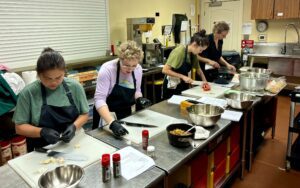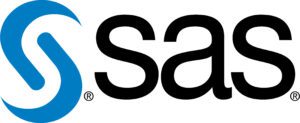Access to Achievement: Pioneering Pathways to Success for Students with Intellectual and Developmental Disabilities in North Carolina

Published: December 19, 2024
Maria Mandis walks into the Dolphin’s Den at College of The Albemarle to meet with a new student to discuss their Person-Centered Plan – a comprehensive roadmap that aligns the student’s community college experience with their academic and career goals.
Together, they begin to create a vision for her future.
This approach lies at the heart of the Access to Achievement program, North Carolina’s innovative pathway to education and economic mobility for individuals with intellectual and developmental disabilities (IDD).
Maria is one of 15 Access to Achievement Coordinators across North Carolina community colleges. She meets with students weekly to discuss their struggles and successes – offering guidance, support, and a trusted resource as they navigate their college journey and explore potential career paths.
Coordinators at each campus provide tailored guidance to all students. Person-Centered Plans address employability, academic success, and independent living skills to empower students to thrive both in and beyond the classroom.
“It’s heartwarming to witness their excitement as we start talking about their dreams and begin making plans to achieve them. Seeing their faces light up and watching them smile is a constant reminder to me of why this work is so meaningful,” she said. “These students have a clear desire, they want to go to college, learn new skills, and pursue meaningful employment. If it’s important to them, then it should be important to us, too.”
Strong Midyear Progress
The program officially launched at 15 community colleges across the state in March 2024 after a successful pilot at Catawba Valley and Brunswick Community Colleges last year. The program was broadly supported by the General Assembly following the pilot, and they approved nearly $4 million in recurring funds to expand to 15 colleges, including:
- Alamance Community College
- Asheville-Buncombe Technical Community College
- Brunswick Community College
- Catawba Valley Community College
- College of The Albemarle
- Guilford Technical Community College
- James Sprunt Community College
- Johnston Community College
- McDowell Technical Community College
- Richmond Community College
- Robeson Community College
- Sandhills Community College
- South Piedmont Community College
- Stanly Community College
- Wilkes Community College
Nancye Gaj, State Director of Access to Achievement, shared a midyear progress report at the State Board of Community Colleges’ board meeting last month. To date, the program has served 327 students, surpassing its original target of 300 students by June 30, 2025. Of these, 150 students have developed Person-Centered Plans with their Coordinator.

“I hoped we would serve 300 students by June, and we’re already there. This program is clearly in high demand, and for the 150 individuals who now have someone walking beside them in their educational journey, it’s a real game changer,” Gaj said. “Witnessing the success of the program and of the students participating in it continues to inspire me every day. It’s a constant reminder that we don’t really know what each one of us is capable of. We all want to have the freedom to dream and work toward a goal.”
Vickie Vinson, Associate Director of Professional Development and Implementation for Access to Achievement, has worked with students with IDD at the community college level since 2010.
“It is only through the establishment of this program that I realized there are so many students with IDD in the community college system that are not identified and are struggling. There are also students in the communities that do not think that college is for them because of their struggles in K-12,” Vinson said. “These students are capable of much more than the opportunities they have been given in the past.”
Exciting Internship Opportunity at SAS
SAS, a leader in advanced analytics and technology solutions, has announced two exciting summer internship opportunities exclusively for students in the Access to Achievement Program. These tech-focused roles reflect SAS’s commitment to fostering talent and achievement among North Carolina community college students.
“Expanding opportunities for students at NC community colleges and those from diverse backgrounds is crucial for building a more inclusive and equitable workforce. By partnering with programs like Access to Achievement and providing learning opportunities through internships, we look to equip individuals with the skills needed to succeed in the evolving tech industry,” said Christal Graves, Diversity Talent Acquisition Lead at SAS. “This approach not only fosters diversity but also ensures that the future workforce reflects a wide range of perspectives, enhancing innovation and problem-solving.”
This initiative supports the program’s mission to provide meaningful career development opportunities while bridging the gap between education and the workforce. The internships are designed to equip students with hands-on experience in the tech industry, aligning with SAS’s dedication to empowering the next generation of talent.
“We are thrilled to partner with SAS for this initiative, which directly aligns with our mission to bridge educational achievements with meaningful workforce opportunities. These internships are more than just roles; they are a gateway for our students to thrive in the tech industry. SAS’s commitment to empowering our students is a significant step forward in fostering not only individual talent but also the broader goal of integrating more diverse perspectives into the tech ecosystem. We believe that these opportunities will catalyze our students’ careers, providing them with the invaluable experience needed to succeed.”
Building a Stronger Talent Pipeline
Access to Achievement is a crucial component of North Carolina’s workforce development strategy. By equipping individuals with IDD with the skills and support they need to succeed, the program is helping to build a more inclusive and diverse talent pipeline.
Industry partners like Biltmore in Asheville are providing real world work experience.
“We’ve had to get creative and dynamic with hiring. There’s a whole demographic that we have an opportunity to reach into when you talk about employees that are neurodivergent or IDD – a pool of candidates that maybe you didn’t tap before,” said Mark Anthony McGruder, Director of Culture and Inclusion at Biltmore. “Some of the resources and approaches we were creating for someone that is neurodivergent were tactics and resources we could use for someone who is neurotypical, and we all benefited from it.”
Sam Thompson, a student at Asheville-Buncombe Technical Community College, started working at Biltmore’s winery last Fall and his supervisors say he adds incredible value to the team.
Watch Sam’s full story here.
“This program is a vital step toward reducing the stigma that has affected adults with IDD for far too long,” Mandis said. “Access to Achievement focuses on what truly matters, students’ abilities, skills, hopes, and dreams, while creating unique pathways to meaningful employment. It takes the commitment of our community colleges and local communities to recognize the value these individuals bring.”
Looking Ahead
With its early success, the Access to Achievement Program is poised to expand its reach and continue transforming lives. As more students enroll and partnerships grow, the program aims to serve as a national model for inclusive education and workforce development.
“My hope is that Access to Achievement will be available at all 58 community colleges in North Carolina, so all individuals in NC can access educational opportunities that lead to employment as it aligns with their hopes and dreams, all resulting in a sustainable wage and a fulfilling life,” said Lindsay Tipton, Associate Director of Pathways and Partnerships for Access to Achievement. “On a broader scale, it is my hope that both parents of children with IDD and the children themselves know that college is an opportunity for them in our state.”
For more information about the Access to Achievement Program, contact Nancye Gaj at ngaj@nccommunitycolleges.edu.

